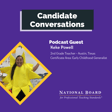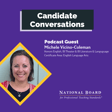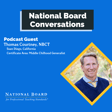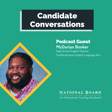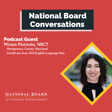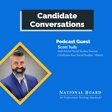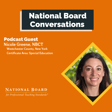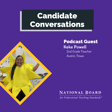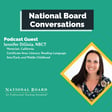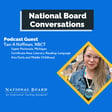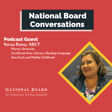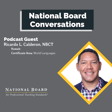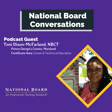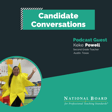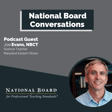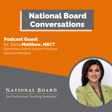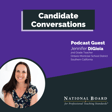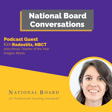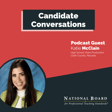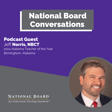Become a Creator today!Start creating today - Share your story with the world!
Start for free
00:00:00
00:00:01

Barry Thomas, NBCT - English Teacher Young Oak Kim Academy - Los Angeles, California
Barry Thomas has been teaching English for 11 years at Young Oak Kim Academy Middle School in Los Angeles, California.
He received his bachelor's degree in English Education at California State University Long Beach and his master's degree in Teaching Pedagogy, along with his teaching credential at USC. He obtained National Board Certification in December of 2021. He also served as English Department Chair for seven years and is mentoring two new teachers through his district's Teacher Growth Induction Program (TGI).
Twitter: @NBPTS
Instagram: @NBPTS
Facebook: The National Board for Professional Teaching Standards
Transcript
Introduction to the Episode
00:00:00
Speaker
Hey everyone, welcome to another episode of National Board of Conversations.
Spotlight on Barry Thomas
00:00:03
Speaker
It's the end of Black History Month and we wanted to make sure we highlight a black MCT advocating for all educators. In this episode, we travel out to LA to speak with Barry Thomas. He's an English teacher doing a lot to push the narrative on black literature in his schools. He's heard a bunch of leadership positions in his department and continues to push boundaries with literature. Here's my conversation with Barry Thomas.
00:00:25
Speaker
Mary Thomas, thank you for joining me on the podcast. It's great to have you. It's my pleasure, Eddie. Thanks for reaching out. All right. So we're going to get right into it. What is your current role and give a brief intro of yourself? And then I got a few questions to get into a little bit in personal society. Sounds good. Sounds good. Yeah. My current role is I am an English teacher. I've been an English teacher for about 11, 12 months. It's my 12th year right now. And I also
00:00:55
Speaker
I also mentor three different teachers through our district programs called the teacher growth induction program so when I passed the national board there were some options and I saw that option and I thought it'd be an awesome thing to get back to other teachers and to work with them and support them. Okay cool so what are your three favorite foods?
Barry's Personal Tastes
00:01:15
Speaker
Three favorite foods pizza,
00:01:19
Speaker
Yes, my first job was at a pizza place. My first job was at a pizza shop, I was like, maybe we just got to make it happen. Roundtable pizza, it's still my favorite pizza to eat right now. And then I have to go with shrimp. I love my shrimp. And then I have to go with steak. I love a good steak. Okay, okay. Three songs that describe you.
00:01:41
Speaker
Yeah. Oh, that's a tough one. I have to say I'm a big MJ fan, Michael Jackson fan. So one of his songs is called Man in the Mirror or Make That Change or something like that. And I like that. That one defines me because that's kind of my ethos, my philosophy. If you want to make the world a better place, take a look at yourself and make a change. So that's one of them. Another one
00:02:05
Speaker
I like a lot of kind of big band stuff like Frank Sinatra. He does a song called, All or Nothing at All. And that's kind of the way I am. It's like when I believe something, I throw myself into it. And then there's another song, Old School, Old School by a gentleman by the name of Nat King Cole. And he sang a song called, Nature Boy. And a line in there says, the greatest thing you'll ever find is just to love and be loved and return. And I think love is an important thing to have.
00:02:35
Speaker
Okay, I'm gonna give it also check out. I've been thinking about big band music the last like week or so. So I'm gonna give those a look. Yeah, my dad raised me on jazz, man, and never left me. So I go back to that old school. Okay, okay. The one sport team that has your heart. And if you're not a sports fan, one movie you can recite line for long.
00:02:53
Speaker
Yeah, I'm torn between my Lakers and my Rams, but if I had to choose one, I am a Lakers fan because one of my favorite basketball players is playing with them now, which is LeBron James, so yeah. Okay, okay. I got my Boston Southie shirt on. I see, I see. We can still get along here, Eddie.
Family Influence and Career Motivation
00:03:16
Speaker
Can you share what got you in there, education?
00:03:19
Speaker
Yeah, I come from a long line of teachers. My dad was a teacher. My aunt was a teacher. My sister was a teacher. And I'm sure that contributed to it. But I have a passion for wanting to help others, right? And I think about my education. And I had some really good teachers that made a huge impact on me. And I still remember their impact
00:03:46
Speaker
to this day. And so I want to make that kind of difference.
Challenges for Black Male Educators
00:03:50
Speaker
So I think all of those things contributed to it. Alright, so you are black male in education, very rare and is becoming even more increasingly rare. What do you think has been leading the cause behind the decline of black male educators? Eddie, that's a fantastic question. Um, I think
00:04:09
Speaker
Well, I know in some states, right, educators are not paid a lot. And when there's a black male who wants to, has the desire to pursue his education, I think he leans towards those jobs that pay a lot, right? So I think a financial element contributes to that.
00:04:32
Speaker
And then maybe, you know, I think black males need to be exposed to education, right? Because I come from a long line of teachers. I think that helped me. So maybe schools can do a better job at kind of having like some kind of workshops or presentations about education and all the benefits that it can bring. So I think that could help. Okay, okay.
00:04:53
Speaker
I try to tell people like a lot of the schools I went to were not very inviting as a black male, right? So it would not make me to go back to work in that environment. And I think even from a young age, if you want to get them into schools, creating a more inviting learning environment would definitely be helpful to getting more black men in the classroom as they get older and
00:05:17
Speaker
see education as a possible career path, because it's somebody like you'll have good memories of a place you want to go back to. Because a lot of times you're there with your friends and good memories, but the building is not very inviting you like, I don't want to work somewhere I don't feel good. That's, that's a great point. And you know, it's almost kind of like a vicious cycle, we need more black males but
00:05:36
Speaker
If you're in there, it's important to see someone who looks like you, right? So I think that makes a big difference, right? So if you don't see yourself in the instructors, that's a part of maybe not feeling as comfortable, even though a person is who they are is who they are, right? So if you're a very genuine person, you're gonna make an impact, but it does help to see somebody who looks like you. No, it does. So what were you like as a student and how does that influence your style now?
Influence of Student Life on Teaching
00:06:05
Speaker
Yeah, you know, my dad was strong on education and he was a heavy disciplinarian so I didn't dare step out of line. I participated, you know, I was respectful and that definitely helps my style because when I'm teaching, I expect, I respect my students and I expect the same kind of respect. I expect them to involve because they are what makes the education effective, right? We need their involvement. So I expect the same thing. So that definitely affects my style and that it affects my experience.
00:06:35
Speaker
expectations.
Journey to Board Certification
00:06:37
Speaker
So now you're national board certified. What pushed you to pursue board certification and what was your journey like? Did you achieve on your first try? Great questions. Um, okay. So what pushed me to it when I, when I, when I started working at my school, Young Oak Kim Academy in Los Angeles, um, there was, there were like three teachers who were nationally board certified who I respected immensely. They were kind of like my mentors who I kind of
00:07:03
Speaker
was mentored from afar. I kind of watched them, even though they didn't know I was watching. And I said, well, I want to be like them. So I began to pursue it. When I was in my master's program at USC, they talked about it. So that kind of sowed a seed in my mind.
00:07:24
Speaker
So between that and seeing them and then hearing about the kind of like the benefits that California has for national board certified teachers, you know, they said 15% increase and there's another stipend if you teach in a high end in an area where there's high need, they give like a $25,000 stipend for the next five years. So there's lots of financial incentives. So those were the things that motivated me. Now my journey
00:07:51
Speaker
Yeah, it was wonderful. It was exciting. It was a bit of hell on earth as well. It was very intense. It was all those things. All right, all right. Yeah, you got there. That's all we need. That's right. So what was the most helpful coaching conversation or resource or advice you received while you were on your journey?
00:08:12
Speaker
Yeah, so those three individuals were nationally board certified. When I came to that school, they all went through a program, a UCLA program, and they recommended that to me. And so I went there and it was great. It was like other teachers, we were supporting each other. And there was an amazing professor there by the name of Erin Powers. And she is just fantastic. She just kind of made it all make sense because it was like a maze of information that you kind of had to cipher through. And so she was a great support.
00:08:42
Speaker
made it doable kind of made you believe in yourself. So I highly recommend some kind of program that's that they're aware of kind of the things you'll go through and they can offer a support. Also I went online and I found resources I found like once I knew what was going to be on the exam I went and
00:09:06
Speaker
I looked up kind of like similar things. So I would kind of like look up AP exams that high schools would give and I would kind of get that information. And then I kind of would tie myself kind of responding to questions relating to those things. I would create like test scenarios for myself as it relates to the standardized test.
00:09:24
Speaker
So that was a huge help to me and just kind of researching practices and pedagogies and standards. I'm sorry, pedagogies and practices that kind of would prepare me for what I'd see on the exam. It's really creative creating your own exam from almost others that are out there like the AP exam and things like that. It's a very creative way to get ahead of what's coming.
00:09:50
Speaker
Well, I learned that in that UCLA program. So those are the kinds of things that you can do it on your own. And that's great. But for me, I couldn't imagine doing it on my own because it's no joke. I went through some pretty strenuous programs. I thought my master's programs were the hardest thing I've gone through. But this was even more challenging than that.
Teaching Literature and Its Impact
00:10:16
Speaker
uh it really helps your thinking it helps you kind of like analyze what you're doing with the students and it makes you a better instructor and that's and for me that's what it's all about so it's black history month and i got you on for for that reason i want to talk a little bit of a black history for this uh podcast so do you have any specific lessons that celebrate black literary contributions and engages your students and thoughtful discussion
00:10:41
Speaker
Yeah, I was speaking to one of my colleagues, a black instructor, and we were discussing this, and I admittedly said, I do have some lessons, and I'm going to share those in a moment, but I think
00:10:56
Speaker
that there's a lot more that I can do as a black educator to try to reach the students as well as you know my students are primarily Hispanic and as well as reaching out to them with Hispanic heroes right to kind of reach those and kind of find that universal thread through it all right that we're all humans and and and the human experience is important
00:11:19
Speaker
And then we can see how we are similar but yes I have a look, I've looked at individuals like Langston Hughes, Maya Angelou, and I've like highlighted them, and I've showed a video about them and we've seen some of their work. And then you look at some of the lines of like Langston Hughes poetry of Hope Deferred, it opens up a whole
00:11:38
Speaker
window of conversation to have with the students, right? What was he feeling? What was the backdrop? What was the experience of the black man during that time? And then finding that universal thread, hey, you wouldn't want to be treated that way. So, you know, no one should be treated that way. And I kind of look at it through the lens, Eddie, you know, Martin Luther King Jr. was one of my heroes, right?
00:11:59
Speaker
that, you know, they would judge people not by the color of their skin, but the content of their character. So through every injustice that the black man faces or any minority to find that universality of, hey,
00:12:12
Speaker
We're all the same and no one deserves to be treated this way. And I think by doing that, you get buy-in from all minorities and races, as well as realizing, look, during the Civil Rights Movement, blacks were not the only people promoting that movement. It was people of all colors and races. So just kind of seeing that connection that
00:12:34
Speaker
that the Black experience has with all of humanity, I think. That's what I try to do by sharing and teaching about these heroes and also getting buy-in from my students. That's awesome. So do you have any particular literary devices from them that you use? Any specific poems or books? Yeah. So again, a poem I hope it's deferred by
00:13:03
Speaker
by Langston Hughes. Also, life is not frightening me at all by Maya Angelou, and in our curriculum, it's a curriculum called Study Sync, there are particular passages on Rosa Parks, Martin King marching on Selma, and so there's whole lessons that open the door to rich
00:13:24
Speaker
conversation that we can talk about our history, talk about where we are, and talk about where we want to go. So yeah, so those particular lessons I've used in the past, and they worked really well. So in your role, do you get a chance to advocate for the importance of diverse literature and representation in all English classrooms?
00:13:43
Speaker
Yeah, so I've been a department chair for the past, well, I've been a department chair for seven years. Currently have another department chair. And because of that, the books that we've read, we've had conversations about those. And so we have input on that. And even though I'm not the department chair now, our current department chair is amazing. And so any books that we feel passionate about,
00:14:06
Speaker
that we want to add to the school, we can do. And so there is that opportunity to do that. And we've had, I think, our current department had just introduced some books on the Holocaust. And so we have that platform to share these things, these important works that we for the students need to know. It's great that the school has an environment of
00:14:33
Speaker
collaboration on this stuff so you're able to speak your voice and talk about the books you're passionate about and be able to bring those to the students. Definitely, definitely. So what advice would you give fellow educators on fostering a more culturally rich English environment during Black History Month?
00:14:51
Speaker
Yeah, I think some of the things that I was kind of mentioning in some of the lessons that I'd like to share is that seeing that common thread of humanity, right, so that as we're in Black History Month, you know, as I want to share about these heroes, right, Langston Hughes, the Rosa Parks, the Martin Luther King, Jr. and recognizing all that they've done for us and what
00:15:16
Speaker
we as Black people have gone through to see, hey, there's a common thread of humanity and connection that we should all have so that if Blacks are mistreated, it's not a Black problem, right? I'm trying to remember a quote by Martin Luther King, but it says that it says something to the effect of
00:15:35
Speaker
injustice allowed anywhere is injustice everywhere, something to that effect. And so I think to share these stories, but seeing how, hey, this could be you. This is a human issue. This is a human problem that all of us have a responsibility to try to solve. I think that opens the door to buying in, opens the door to facilitating an environment where diverse people can feel included.
Promoting Education Careers
00:16:10
Speaker
So we're gonna get into the teacher recruitment phase of this podcast now. I need your elevator pitch. If you had to sell that education profession for someone looking to get into it in one to two minutes, what would you tell them?
00:16:22
Speaker
One or two minutes. Yes. So again, I think the financial issue I think is a big issue for those who want to get into the profession. But I think there's been some improvements. I think as recently in California and teachers, I believe had anywhere from 15 to 20 percent increase over the next five years in teaching. So that's been helpful. Again, talking about the
00:16:43
Speaker
the program from the state in California, how $25,000 extra over five years if you're teaching at a high need school and you are national board certified. Also, you can't bypass that two and a half months off you have over the summer, but more importantly, and all the finance and all the things that make your life nicer is the impact that you make on students. We've had like little fairs and things and past students have come back.
00:17:10
Speaker
And students come back and say, Mr., I'm in college and I'm doing this and I'm doing that. And to me, that's more important than any amount of money that you can pay. But that is my philosophy. I want to give back. And I think if you want to make a difference, a real difference in a life that's going to last, become an educator.
Encouragement to Colleague
00:17:29
Speaker
All right. So last day, like you, you saw those national board certified teachers in your school and said you wanted to be like them, but we wanted to do a more direct way.
00:17:37
Speaker
and let you shoulder tap a colleague and let them know they're ready to become National War certified. So here you'll give them a shout out and on social media, we'll encourage them to go through the process. So Barry Thomas, who are you shoulder tapping?
00:17:50
Speaker
Yeah, I am shoulder tapping my colleague, Christopher Wenell. He is a quality teacher and he is more than ready to begin his national board journey. All right, look out for that. Barry Thomas, thank you for joining me on the podcast. Thank you, Eddie. Thank you for your time. I really enjoyed it.
Episode Conclusion
00:18:08
Speaker
It was great to talk with Barry. It was a very insightful conversation. I want to thank him again for taking the time to chat with me and thank you for listening to this episode of National Board Conversations. Be sure to like, share, and subscribe to the podcast wherever you listen.
00:18:20
Speaker
and we'll see you next time.
